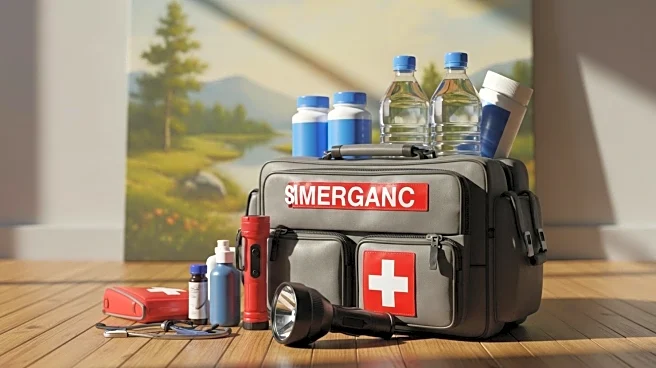What's Happening?
The Federal Emergency Management Agency (FEMA) has released guidelines to help individuals and families prepare for natural disasters, coinciding with National Preparedness Month. With the recent formation of Hurricane Kiko in the Pacific Ocean and increased hurricane activity in the Atlantic, FEMA emphasizes the importance of creating an emergency kit and making a comprehensive plan. The recommended emergency kit includes essentials such as water, non-perishable food, a battery-powered radio, flashlight, first aid kit, and other items necessary for survival and sanitation. FEMA also advises on creating a personalized plan that considers factors like evacuation routes, communication strategies, and specific needs of household members, including dietary and medical requirements.
Why It's Important?
The guidelines from FEMA are crucial as they aim to mitigate the impact of natural disasters on communities by ensuring preparedness. With hurricane activity on the rise, these measures can significantly reduce the risk of harm and improve response times during emergencies. Proper preparation can lead to fewer casualties and less property damage, ultimately saving lives and resources. The emphasis on personalized plans ensures that diverse needs are met, which is vital for vulnerable populations such as the elderly, disabled, and those with specific medical needs. By promoting preparedness, FEMA helps communities build resilience against the unpredictable nature of natural disasters.
What's Next?
As hurricane season progresses, individuals and communities are encouraged to review and update their emergency preparedness plans. Local governments and organizations may conduct drills and workshops to educate the public on effective disaster response strategies. FEMA will likely continue to monitor weather patterns and provide updates and resources to assist in preparation efforts. Community leaders and policymakers may also advocate for improved infrastructure and emergency services to better handle potential disasters.
Beyond the Headlines
The focus on preparedness highlights broader issues such as climate change and its role in increasing the frequency and intensity of natural disasters. This initiative may spur discussions on sustainable practices and policies aimed at reducing environmental impact and enhancing disaster resilience. Additionally, the emphasis on personalized plans underscores the importance of inclusivity in emergency management, ensuring that all community members, regardless of their circumstances, have access to necessary resources and support.









